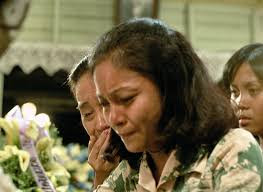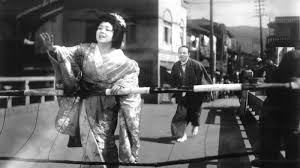 |
| Marlene Dietrich, Willi Forst, Cafe Electric |
There was prolonged applause at the end of Cafe Electric but it may have had something to do with the crowd's acknowledgement of the virtuoso accompaniment on piano, piano accordion and flute by Stephen Horne and less to do the morality movie included in the Marlene Dietrich strand. The programme notes focussed on Dietrich's turn, a rather minor and far from compelling contribution. The notes also failed to mention in any way that the film was missing its last reel and the abrupt ending with some words describing what happened caused more than a bit of "Whaaat!" throughout the Arlecchino Cinema. Superb digital restoration of the remaining seven eights of the film by the Austrian Film Museum
 |
| Edward G Robinson, Humphrey Bogart The Amazing Dr Clitterhouse |
But on to better things and a smart move by the programmers not to do Anatole Litvak chronologically but to start with one of his best American films The Amazing Dr Clitterhouse with Edward G Robinson as a pyschiatrist study the criminal mind whose research takes him into the heart of gang where he orchestrates a brilliant series of robberies. "A film and three quarters" said a companion. John Huston's name as the second scriptwriter suggests he was brought in to put the polish on an adaptation of a play by Barre Lyndon. A packed house watched a very good 35mm print.

Nora Aunor, Bona
Bona by Lino Brocka is almost unknown outside the Phillipines but Carlotta Films in Paris have managed to retrieve the materials that were in France after Pierre Rissient placed the film in the Quinzaine back in 1981. The driving force may have been the lead actress Nora Aunor who plays the title role and produced the picture. She is the quintessential oppressed young woman in a Catholic patriarchal society where fathers and brothers whip and beat women who step out of line. Bona has made the mistake of becoming infatuated with Gardo, a preening philandering film extra, and she runs away from home and moves herself into his 'house' as a servant prepared to suffer all manner of indignity just to be near her idol. The applause at the ending was seriously well-deserved and you felt it wan't just the movie itself but Bona's final violent action which abruptly concludes proceedings that was being strongly endorsed. Superb 4K restoration.
 |
| Machiko Kyo, Clothes of Deception |
Kozaburo Yoshimura is almost unknown outside Japan and curator Alex Jacoby suggested some of the titles in the strand will literally be having their first ever screenings outside Japan. The Kyoto set story , variously titled Clothes of Deception, Under Silk Garments and on the 35 mm print itself The Disguised. The story of rival families who operate geisha houses tips into modernity as the youngest children of the families fall in love with each other and run into snobbery before things are settled. Standout is Machiko Kyo as Kimicho, the smartest and most cynical of the young geisha women and her increasing efforts at keeping ridiculous male admirers at bay.
No comments:
Post a Comment
Note: only a member of this blog may post a comment.